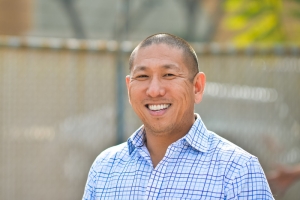Alumnus Spreads Kinship Among Fellow Former Gang Members
June 25, 2015 / by Shirley S. Shin- Alumni
Steven Kim, MSW ’06, knows intimately what rock bottom looks like. Growing up an at-risk youth with little to no family support, he got involved with the wrong crowd and found refuge in substance abuse.
“As a youth without a strong family network, I looked for family outside the home. I grabbed the first hand that was available … and the hand that I found was a gang. Things eventually escalated to living on the streets,” he said. “You hit that place you don’t know how to get out of. But through great support from people and organizations, I found my way into recovery and rebuilding my life.”
Kim knows he wouldn’t be where he is today without the help he received during what he calls his darkest times and has dedicated his life to serving those like him. In 2014, he created Project Kinship, an Orange County-based nonprofit that works to reintegrate former gang members and the incarcerated back into the community. From case management services and group counseling to educational and skills classes, Project Kinship aims to provide participants with an all-encompassing support network to help them develop the coping skills that lead to meaningful and productive lives.
His end goal is ambitious: making communities safer. While Project Kinship has been able to help hundreds of people in the last year, Kim recognized that in order to achieve this goal the organization would need to reach even more people.
In partnership with the USC School of Social Work, Project Kinship recently launched the Community Intervention Worker (CIW) certificate program, which aims to train, educate and empower community members with tools to mitigate risk factors that contribute to violence.
“People with a history are assets to our community if they’re able to serve the community,” Kim said. “We have all these folks who want to work with this population but don’t have access to a high-level of training. This program gives them the training they need to become mentors and advocates who can help break the cycles of gangs and incarceration in our communities.”
All in the family
When Kim found his way out of rock bottom, he juggled multiple minimum-wage jobs to make ends meet. He eventually found a lifeline in social work and went on to receive his bachelor’s degree from the University of California, Irvine, and a Master of Social Work from USC.
After 15 years of working with traumatized and abandoned youth throughout Orange County and organizing conferences to educate others on the needs of the reentry population, Kim was compelled to start a “family” of his own. Inspired by Father Gregory Boyle’s Homeboy Industries, Kim based Project Kinship on the fundamentals of family.
“The whole idea is kind of like [the animated Disney movie] ‘Lilo and Stitch’ – no one is left behind. Basically we don’t give up on people,” he said. “The culture of our organization is to walk with people, embrace them and meet them where they’re at. The goal is for us to help them so that they will not get rearrested and can successfully re-enter society.”
Project Kinship concentrates on four areas: direct services through counseling and case management; outreach and engagement in schools, neighborhoods and partnering agencies; technical assistance through consulting, conferences and research to support the development and dissemination of best practices; and an internship and volunteer leadership program for students and community members interested in working in the field of social work.
“We really focus on trauma-informed work. Our clinicians identify trauma that our population experiences, and we provide them treatment for that trauma to get them to a place of healing,” Kim said. “Ultimately, we want to help them find strength in themselves.”
It takes a village
The new CIW certification program is one way in which Project Kinship hopes to achieve this. A product of months of collaboration and planning between Kim, USC Clinical Associate Professor Conrad Fuentes and other community leaders, the program is designed primarily for individuals who have been impacted by gang violence and the criminal justice system.
“What we are doing is groundbreaking here in Orange County, and I am so glad USC is a part of this movement,” Fuentes said. “I think that as a society we have begun to understand that we cannot incarcerate our way out of this problem, but that we need to address the deeper issues surrounding people’s behavior.”
Thirty-three members were selected for the first cohort. Meeting once a week at the USC Orange County Academic Center, participants learned causes and risk factors for community violence through a trauma-informed perspective as well as ways to react to crises, perform street mediation and rumor control, and broker and maintain peace in the community.
“By training these individuals, we are giving them tools that allow them to better serve the communities they live in, which will all impact community safety. It’s the idea of paying it forward,” Kim said.
The first cohort completed the course requirements in March and held a graduation ceremony at the academic center. Some of the graduates have become part-time or voluntary street outreach workers for Project Kinship, and many continue to meet with staff for additional training and support services.
“What makes Project Kinship special [is] that we bring hope to the hopeless,” Fuentes said. “It offers an individual a chance to put his life back together and do something different but in an accepting environment. We focus on healing the wounds that started the problem, and therein lies the hope.”
To reference the work of our faculty online, we ask that you directly quote their work where possible and attribute it to "FACULTY NAME, a professor in the USC Suzanne Dworak-Peck School of Social Work” (LINK: https://dworakpeck.usc.edu)
